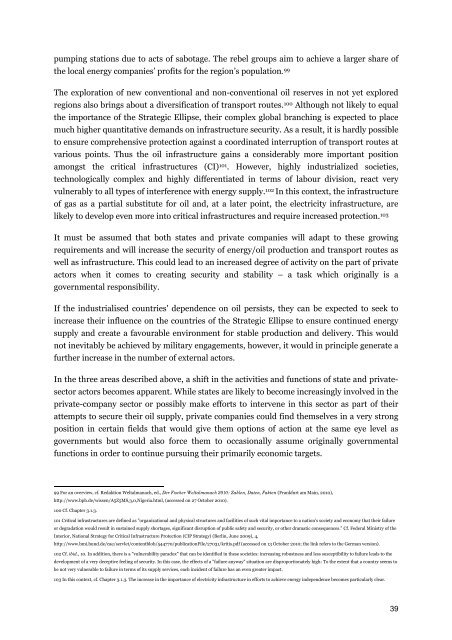PEAK OIL
PEAK OIL
PEAK OIL
Create successful ePaper yourself
Turn your PDF publications into a flip-book with our unique Google optimized e-Paper software.
pumping stations due to acts of sabotage. The rebel groups aim to achieve a larger share of<br />
the local energy companies’ profits for the region’s population. 99<br />
The exploration of new conventional and non-conventional oil reserves in not yet explored<br />
regions also brings about a diversification of transport routes. 100 Although not likely to equal<br />
the importance of the Strategic Ellipse, their complex global branching is expected to place<br />
much higher quantitative demands on infrastructure security. As a result, it is hardly possible<br />
to ensure comprehensive protection against a coordinated interruption of transport routes at<br />
various points. Thus the oil infrastructure gains a considerably more important position<br />
amongst the critical infrastructures (CI) 101 . However, highly industrialized societies,<br />
technologically complex and highly differentiated in terms of labour division, react very<br />
vulnerably to all types of interference with energy supply. 102 In this context, the infrastructure<br />
of gas as a partial substitute for oil and, at a later point, the electricity infrastructure, are<br />
likely to develop even more into critical infrastructures and require increased protection. 103<br />
It must be assumed that both states and private companies will adapt to these growing<br />
requirements and will increase the security of energy/oil production and transport routes as<br />
well as infrastructure. This could lead to an increased degree of activity on the part of private<br />
actors when it comes to creating security and stability – a task which originally is a<br />
governmental responsibility.<br />
If the industrialised countries' dependence on oil persists, they can be expected to seek to<br />
increase their influence on the countries of the Strategic Ellipse to ensure continued energy<br />
supply and create a favourable environment for stable production and delivery. This would<br />
not inevitably be achieved by military engagements, however, it would in principle generate a<br />
further increase in the number of external actors.<br />
In the three areas described above, a shift in the activities and functions of state and privatesector<br />
actors becomes apparent. While states are likely to become increasingly involved in the<br />
private-company sector or possibly make efforts to intervene in this sector as part of their<br />
attempts to secure their oil supply, private companies could find themselves in a very strong<br />
position in certain fields that would give them options of action at the same eye level as<br />
governments but would also force them to occasionally assume originally governmental<br />
functions in order to continue pursuing their primarily economic targets.<br />
99 For an overview, cf. Redaktion Weltalmanach, ed., Der Fischer Weltalmanach 2010: Zahlen, Daten, Fakten (Frankfurt am Main, 2010),<br />
http://www.bpb.de/wissen/A5Z5MS,3,0,Nigeria.html, (accessed on 27 October 2010).<br />
100 Cf. Chapter 3.1.3.<br />
101 Critical infrastructures are defined as "organizational and physical structures and facilities of such vital importance to a nation's society and economy that their failure<br />
or degradation would result in sustained supply shortages, significant disruption of public safety and security, or other dramatic consequences." Cf. Federal Ministry of the<br />
Interior, National Strategy for Critical Infrastructure Protection (CIP Strategy) (Berlin, June 2009), 4,<br />
http://www.bmi.bund.de/cae/servlet/contentblob/544770/publicationFile/27031/kritis.pdf (accessed on 13 October 2010; the link refers to the German version).<br />
102 Cf. ibid., 10. In addition, there is a "vulnerability paradox" that can be identified in these societies: increasing robustness and less susceptibility to failure leads to the<br />
development of a very deceptive feeling of security. In this case, the effects of a "failure anyway" situation are disproportionately high: To the extent that a country seems to<br />
be not very vulnerable to failure in terms of its supply services, each incident of failure has an even greater impact.<br />
103 In this context, cf. Chapter 3.1.3. The increase in the importance of electricity infrastructure in efforts to achieve energy independence becomes particularly clear.<br />
39


